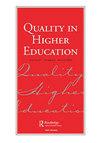“我们足够固执地创造自己的世界”:项目主管如何在相互依存中构建高等教育质量
IF 1.5
Q3 EDUCATION & EDUCATIONAL RESEARCH
引用次数: 4
摘要
关于高等教育质量这个复杂的概念是如何被一群关键的大学行为者——教育项目负责人理解和(战略性地)处理的,我们知之甚少。对深度访谈进行了框架分析,以探索荷兰社会科学部门的学士课程主任如何理解和制定质量,同时保持多重承诺。分析显示,董事们对质量的理解没有问题,认为质量就是实现一个好的教育项目。他们制定了不同的质量框架,同时坚持自己的计划和立场,但在实践中面临问题。平衡不同的目标和利益是一种反复出现的策略。然而,董事们实施其质量观点的回旋余地取决于职位。尽管一些董事可以在任何方向上发挥作用,但其他人却没有权力。质量的可塑性提供了保持改进思想的灵活性,即使在有限的情况下,同时在更基本的层面上防止结构变化。本文章由计算机程序翻译,如有差异,请以英文原文为准。
‘We’re stubborn enough to create our own world’: how programme directors frame higher education quality in interdependence
ABSTRACT Little is known about how the complex notion of higher education quality is understood and (strategically) handled by a specific group of key university actors: directors of educational programmes. A framing analysis of in-depth interviews was conducted to explore how bachelor-programme directors in Dutch social science departments understand and enact quality, while maintaining multiple commitments. The analysis revealed that directors share a non-problematic, understanding of quality as realising a good educational programme, programme. They enact different quality frames while upholding their programme and position but face issues in practice. Balancing different goals and interests is a recurrent strategy. The directors’ room for manoeuvre to enact their quality views, however, is position-dependent. Whereas some directors can play it out in any direction, others experience responsibility without power. Quality’s plasticity provides the flexibility to maintain the idea of improvement, even in limiting circumstances, while preventing structural changes at a more fundamental level.
求助全文
通过发布文献求助,成功后即可免费获取论文全文。
去求助
来源期刊

Quality in Higher Education
EDUCATION & EDUCATIONAL RESEARCH-
CiteScore
3.30
自引率
14.30%
发文量
32
期刊介绍:
Quality in Higher Education is aimed at those interested in the theory, practice and policies relating to the control, management and improvement of quality in higher education. The journal is receptive to critical, phenomenological as well as positivistic studies. The journal would like to publish more studies that use hermeneutic, semiotic, ethnographic or dialectical research as well as the more traditional studies based on quantitative surveys and in-depth interviews and focus groups. Papers that have empirical research content are particularly welcome. The editor especially wishes to encourage papers on: reported research results, especially where these assess the impact of quality assurance systems, procedures and methodologies; theoretical analyses of quality and quality initiatives in higher education; comparative evaluation and international aspects of practice and policy with a view to identifying transportable methods, systems and good practice; quality assurance and standards monitoring of transnational higher education; the nature and impact and student feedback; improvements in learning and teaching that impact on quality and standards; links between quality assurance and employability; evaluations of the impact of quality procedures at national level, backed up by research evidence.
 求助内容:
求助内容: 应助结果提醒方式:
应助结果提醒方式:


